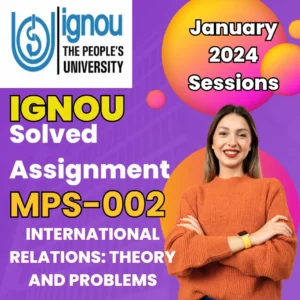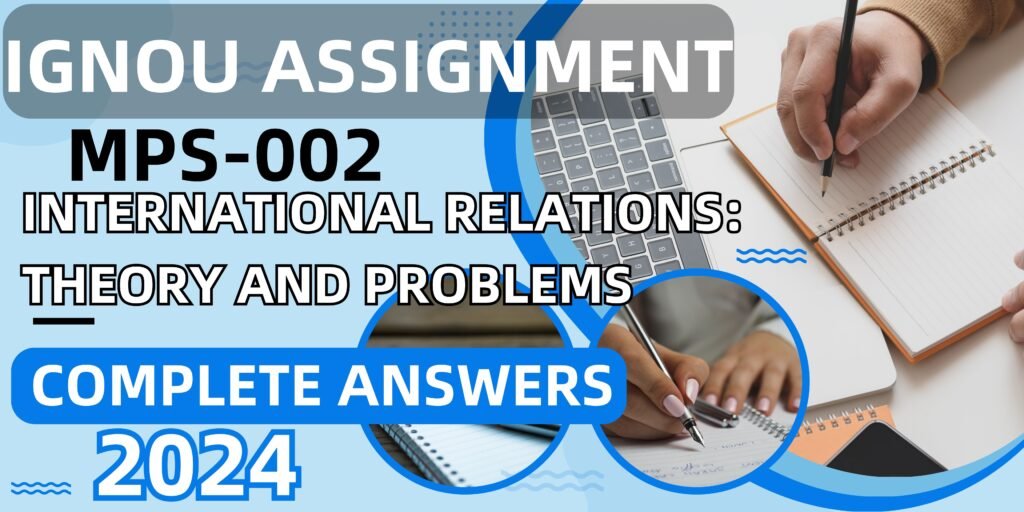IGNOU MPS Assignment Answer 2024 (MPS-004) COMPARATIVE POLITICS: ISSUES AND TRENDS
COMPARATIVE POLITICS: ISSUES AND TRENDS
Course Code: MPS-004
Assignment Code: ASST/TMA/2023-24
Marks: 100
Answer five questions in all, selecting at least two questions from each section. Each question is to be answered in about 500 words. Each question carries 20 marks.
SECTION-I
- Political science can deal with ‘state building’ better than ‘nation building’ Explain.
- Briefly describe the main approaches to the study of Nationalism.
- In what ways has globalization affected state sovereignty? Explain.
- What do you understand by self–determination? Evaluate the debate on self–
determination. - Write a short note on each part of the following questions in about 250 words:
a) Gramsci on Civil Society
b) Pluralist liberal theory of the state
SECTION-II
- What do you understand by ethnic identity? Why do ethnic groups get politically activated?
- Write a short note on each part of the following questions in about 250 words:
a) Characteristics of military regimes
b) Maurice Duverger’s classification of Party Systems - Describe and evaluate the position of developing countries on key issues in the environment debate
- Write a short note on each part of the following questions in about 250 words:
a) Development approach to participation
b) Eco-feminism - Describe and evaluate major trends of Human Development in developing countries.
Click Here download Assignment Questions from Official IGNOU website
Answer of All Questions
Note: Students should write Only 5 Questions-Answers in this paper, i.e- If you write any 2 Answers in Section-I then you have to write any 3 Answer in Section-II. In that way If you write any 3 Answers in Section-I then you have to write any 2 Answer in Section-II
Answer five questions in all, selecting at least two questions from each section. Each question is to be answered in about 500 words. Each question carries 20 marks.
SECTION-I
1. Political science can deal with ‘state building’ better than ‘nation building’. Explain.
Political science, as a discipline, encompasses the study of governance, political systems, and the functioning of states. When examining the concepts of ‘state building’ and ‘nation building,’ it becomes evident that political science is better equipped to analyze and address the former rather than the latter. State building refers to the development and strengthening of state institutions, while nation building involves fostering a sense of shared identity and unity among diverse populations. Several factors contribute to the assertion that political science is more adept at handling state building than nation building.
Firstly, political science has a strong foundation in understanding the structures and mechanisms of states. It delves into the intricacies of governance, the rule of law, and the establishment of effective institutions. State building primarily revolves around creating and maintaining stable governmental structures, formulating and implementing sound policies, and ensuring the rule of law. Political scientists can draw on theoretical frameworks and empirical analyses to identify the key components necessary for building robust state institutions. This includes examining issues such as bureaucratic efficiency, the separation of powers, and the establishment of a functional legal system.
In contrast, nation building involves addressing cultural, social, and historical factors that contribute to a cohesive national identity. This task often extends beyond the scope of political science, requiring insights from disciplines like anthropology, sociology, and cultural studies. Understanding and influencing shared values, cultural symbols, and historical narratives are complex processes that go beyond the traditional focus of political science. While political scientists may analyze the impact of identity on political behavior, fostering a shared national identity requires a broader interdisciplinary approach.
Secondly, state building is inherently linked to the establishment of effective governance structures and the provision of public goods and services. Political science can offer insights into the design and functioning of political institutions, the formulation of policies, and the management of public resources. The discipline’s emphasis on the practical aspects of governance positions it as a valuable tool for addressing challenges related to state building, such as corruption, administrative inefficiency, and the establishment of a functional legal system.
Nation building, on the other hand, involves shaping collective identity, fostering social cohesion, and addressing historical grievances. These tasks often require interventions in education, media, and cultural practices, areas where political science alone may struggle to provide comprehensive solutions. Understanding the intricate dynamics of cultural integration, social harmony, and historical reconciliation demands perspectives from fields beyond political science.
Thirdly, political science has a long history of analyzing state-building processes in various contexts, providing a wealth of knowledge and experience to draw upon. The study of state formation, institution-building, and governance has been central to the discipline. This accumulated knowledge allows political scientists to offer practical insights and policy recommendations for effective state building based on historical and comparative analyses.
In contrast, nation building involves a highly context-specific and subjective process that varies significantly across different societies. The diversity of cultural, historical, and social factors influencing national identity makes it challenging to develop universal theories or frameworks applicable to all cases. This complexity makes nation building inherently more challenging for political science to address comprehensively.
In conclusion, while political science is well-suited to analyze and contribute to state-building processes, it faces limitations when it comes to nation building. The latter involves a multidimensional and interdisciplinary approach that extends beyond the traditional boundaries of political science. Recognizing this distinction allows for a more nuanced understanding of the strengths and limitations of political science in addressing the complex challenges of state and nation building.
2. Briefly describe the main approaches to the study of Nationalism.
The study of nationalism, a complex and multifaceted phenomenon, has been approached from various perspectives within the realms of social sciences and humanities. Scholars have developed several key approaches to understand the origins, manifestations, and impacts of nationalism. Here, we briefly explore some of the main approaches to the study of nationalism.
Primordialist Approach:
The primordialist approach posits that nationalism is rooted in deep-seated, primordial attachments such as ethnicity, language, or religion. It emphasizes the innate and enduring nature of these identity markers, considering them as the foundations of nationalist sentiments. According to this perspective, nationalism emerges from a shared sense of belonging and common heritage. However, critics argue that this approach oversimplifies the complex and dynamic nature of national identities by neglecting historical and socio-political factors.
Modernist Approach:
In contrast to primordialism, the modernist approach contends that nationalism is a modern and socially constructed phenomenon. It asserts that nations and national identities are products of specific historical contexts, often emerging with the rise of modern states, bureaucracies, and industrialization. Key figures in this approach, such as Benedict Anderson, highlight the role of print capitalism and imagined communities in shaping nationalist sentiments. Modernists argue that nations are not natural or ancient entities but are actively constructed through various social, political, and cultural processes. (Continue….)
Click Here for Complete Answer
Download Complete Answer PDF
-
MA Political Science IGNOU MPS-001 Assignment Solutions
Original price was: ₹600.00.₹100.00Current price is: ₹100.00. Add to cart -
MA Political Science IGNOU- MPS-002 Assignment Solutions
Original price was: ₹600.00.₹100.00Current price is: ₹100.00. Add to cart -
MA Political Science IGNOU- MPS-003 Assignment Solutions
Original price was: ₹600.00.₹100.00Current price is: ₹100.00. Add to cart -
MA Political Science IGNOU- MPS-004 Assignment Solutions
Original price was: ₹600.00.₹100.00Current price is: ₹100.00. Add to cart
Also Read:
- IGNOU (MPS-001) Political Theory Assignment Answers
- IGNOU (MPS-002) International Relations: Theory And Problems Assignment Answers
- IGNOU (MPS-003) INDIA: DEMOCRACY AND DEVELOPMENT Assignment Answer 2024
ignou mps assignment answer 2024 ignou mps assignment answer 2024 ignou mps assignment answer 2024 ignou mps assignment answer 2024 ignou mps assignment answer 2024 ignou mps assignment answer 2024 ignou mps assignment answer 2024 ignou mps assignment answer 2024 ignou mps assignment answer 2024 ignou mps assignment answer 2024 ignou mps assignment answer 2024 ignou mps assignment answer 2024 ignou mps assignment answer 2024 ignou mps assignment answer 2024







